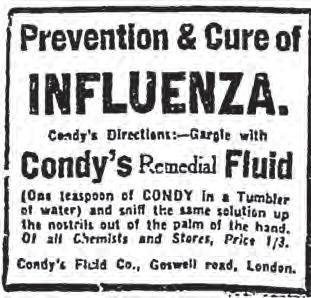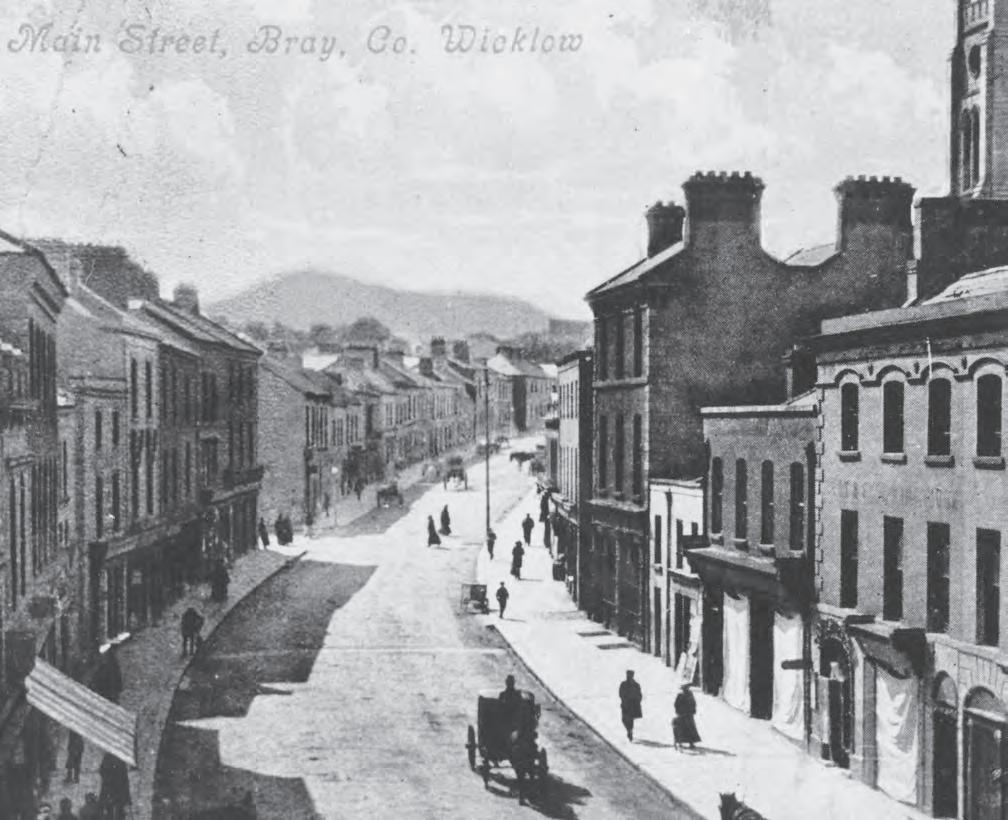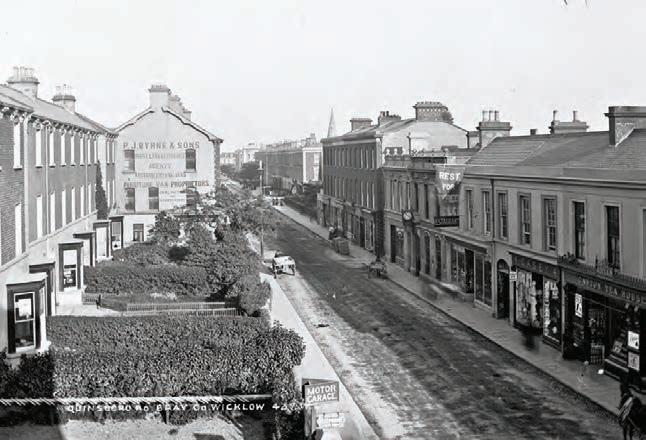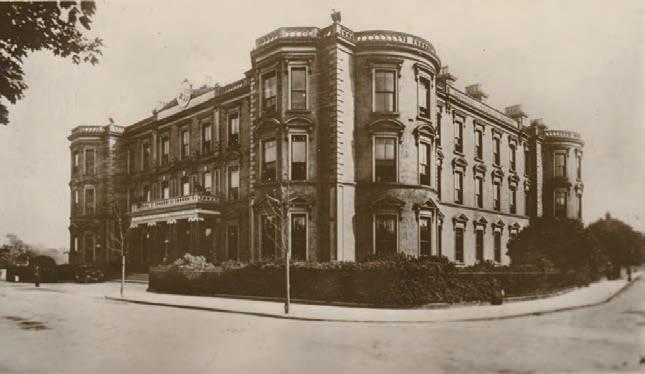
18 minute read
Two weeks in Bray, Easter 1919 — James Scannell
BRAY – James Scannell
Two weeks in Bray, Easter 1919
Advertisement
Local newspapers and the proceedings of Bray Urban District Council (UDC) and the Rathdown Board Guardians reveal that even as the War of Independence was gathering pace across the country and the Spanish flu was exacting a heavy toll, in many ways, normal life continued in extraordinary times.
Saturday 12 April
Bray Petty Sessions
Sir Albert Meldon presided at a sitting of the Bray Petty Sessions (District Court), at which he was joined on the bench by Col. G. Rowan-Hamilton, Mr. M. Langton, Mr. Wellington Darley, Mr. W. Sullivan (RM), Mr. V. C. Le Fanu, Mr. J. W. Reigh, Mr. F. Jameson, and J. Cuddy. The police representative was District Inspector H. B. Molony.
Influenza death
Sir Albert Meldon opened the proceedings by stating that the magistrates had learned with great regret of the death of Constable McGoldrick who had died from influenza, which was widespread in the town and had affected nearly every household. The District Inspector thanked the magistrates for their expression of sympathy, stating that the deceased had only been married for a short time and had been cut off in the prime of his life.
Boy banished
Bray Esplanade, 1924. In the case of the much adjourned proceedings Photo: Courtesy of Wicklow against Shankill boy Andrew Rourke, Sergeant County Library Hurst (Ballybrack) said that the boy had left the district but was not in Scotland where his father had promised to send him. His father said that he would not be brought back and Sir Albert Meldon, in dismissing the case without prejudice, said that if
the boy returned to the district, Sergeant Hurst could reinstate the charges against him. Shankill police station had been closed at the end of March 1918 with policing of the Shankill district divided between Bray, Enniskerry, and Ballybrack stations.
Cottage repossessed
Mr. David Frame, Bray Head House, was granted a decree for possession of a cottage occupied by Mr. Thomas McDonald at Newcourt. Mr. O’Dwyer, solicitor for Mr. McDonald, wrote stating that there was a claim under the Workmen’s Compensation Act by Mr. McDonald against Mr. Frame for hearing at the next Quarter Sessions as his client’s half-wages had not been paid and he had advised his client to submit to the demand for possession. Mr. J. J. Murphy, solicitor for Mr. Frame, said that Mr. McDonald had met with an accident while employed by Mr. Frame and that the compensation proceedings were pending, but that Mr. Frame had to comply with the instructions of the insurance company.
Butter and milk watered down
Sergeant Wall, Food Inspector, summoned Mr. James Cleary, Main Street, Bray, for ‘having sold butter containing excess water.’ Mr. McDonnell, solicitor for Mr. Cleary, applied for an adjournment on the grounds that Mr. Cleary was ill. He added that he had notified Sergeant Wall and the Drumkeen Dairy Company, Co. Limerick, that he would be seeking an adjournment and that although he sent the letter to them the previous Wednesday, it had not been received in time. Mr. Bradley, solicitor for the dairy company, said that they had been brought into the case as the manufacturer of the butter under warranty. The adjournment was granted. Mr. Denis Flynn, Glencormack, was summoned by Sergeant Wall for ‘selling new milk which had been adulterated with 10% added water.’ Mr. McDowell, who appeared for Mr. Flynn, said that his client was astonished when he received the summons and that he could not understand how the water got into the milk seeing that he milked the cows and delivered the milk himself. The only explanation that Mr. Flynn could offer was that he fed his cows on mangles, which made for very poor feeding. Sergeant Wall said Mr. Flynn had ten cows and sold his milk mainly in Little Bray. Sir Albert Meldon, in finding the case proved, said that this was a very serious offence as the milk was sold amongst the poor who were paying a high price for it and that it was terrible that they should receive adulterated milk. Mr. Flynn was fined £3, with 14s. costs.
Donkeys wandering
Patrick Flanigan, one offence, and Margaret Gaynor, two offences, both from Captain’s Avenue, Little Bray, were summoned for allowing donkeys to wander on the road, and were fined 2s. for each offence.
Lorry abandoned
Constable Moore summoned Mr. Robert Comey, Green Park Road, Bray, for ‘leaving an obstruction on the public road at Bray Bridge.’ In his evidence, the constable said that he found two large parked lorries laden with timber and was told that one of the men deserted his lorry and had gone to Calary Races. District Inspector Molony told the court that the County Surveyor had complained about these obstructions. Mr. Comey was fined 10s. and costs.
Sunday 13 April
Road death witnessed
In Dublin, at an inquest into the death of 54-year-old Mr. John Sheehan, 3 Albert Place, Charlemont Street, Dublin, who died in the Meath Hospital as the result of injuries received from being knocked down by a military motor lorry, the principal witness was Mr. John Whitmore, engine driver, Bray. Mr. Whitmore said that on 22 February, he and the deceased were being driven from Peamount to Dublin. At Drimnagh, they alighted from the car and a military lorry following behind struck the deceased and broke both his kegs. The jury returned a verdict attributing negligence to the driver.
Spanish flu
The funeral of Constable McGoldrick, Esmonde Terrace, Bray, who had died from influenza the previous Friday, took place to St. Peter’s Cemetery, Little Bray. Aged 29, he was a native of Midleton, Co. Cork, and had served as policeman for eleven years. Prior to being transferred to Bray in September 1918, he had been stationed in Newtownmountkennedy, Co. Wicklow. Married for only eight months, his wife had also been seriously ill with influenza when he died. Graveside payers were recited by Rev. Fr. Healy, C.C. The chief mourners were his wife, brother, father-in-law, and brother-in-law.
The two weekly local newspapers reported widely on the third wave of the influenza pandemic, known as the ‘Spanish flu’, which was still affecting people in the town, with doctors overworked, many people still contracting it, suffering it, or left debilitated by it. One product advertised for the prevention and cure
of influenza was ‘CONDY’S Remedial FLUID’ which users were urged to gargle and snort by placing ‘one teaspoon of CONDY in a tumbler of water and sniff[ing] the same solution up the nostrils out of the palms of the hand.’
Monday 14 April
Bray UDC
Mr. J. M. Magee, Chairman, presided at a meeting of the Bray Urban District Council. The attendance included Mr. M. Langton (JP), Mr. J. Metcalfe, Mr. G. Byrne, Mr. J. Bergin, Mr. M. Traynor, Mr. P. J. Dunne, Mr. J. Plunkett, Town Clerk Mr. J. McCaul, and Town Accountant Mr. P. Devitt.
Mr. J. Metcalfe, in accordance with his notice, moved that all increases granted to Council employees by way of war bonuses should be regarded as permanent increases in wages. After a short discussion, the motion was carried unanimously.

Coal prices and supplies
The Town Clerk advised the meeting that he had been in contact with the town’s coal merchants and the Coal Controller concerning fixing the price for coal. Mr. Collier had suggested that Bray should adopt Kingstown (Dún Laoghaire from 1920) prices plus the extra rates and dues which would amount to about 2s. 6d. per ton. The Coal Controller stated that he saw no need to send down a representative to Bray as they should be able to resolve the matter themselves, adding that in Dublin merchants were allowed 12s. 6d. per ton to cover distribution costs plus 1s. 2d. per ton profit in addition to the cost of the coal. Mr. Collier from Messrs Miller & Co. and Mr. Maxwell from Messrs Heiton & Co. attended this part of the meeting. No agreement was reached after extended negotiations. However, Mr. Collier said that he would willingly hand over his concern to the Council to operate if he was guaranteed a profit of 1s. per ton on his coal. A committee consisting of the Chairman (Mr. J. M. Magee (JP)), Mr. Metcalfe, and the Town Clerk (Mr. John McCaull ) was appointed to look into this matter.
Accepted as contractors for supplies to the Council were Messrs J. E. Griffin & Sons, Brooks Thomas & Company, Raverty’s Medical Hall, Tonge & Taggart, R. Foley, P. Keegan, the Electrical Apparatus Company, the Imperial Lamp Company, Messers Faulkner, Dublin, and George Foster, Bray. Mr. Metcalfe urged the Council to ensure that all these suppliers should only employ trade union labour.
Gas prices
A letter from the Board of Trade in connection with the Alliance & Dublin Consumers Gas Company’s application for permission to increase the price for gas stated that it would allow the company to increase the dividend paid to shareholders but would limit the increase in prices. The Gas Company also submitted a letter relating to the proposed reduction in pressure to consumers which was referred to the General Purposes Committee to consider. Mr. Metcalfe said that the Council should ensure that the Gas Company kept the gas up to standard and suggested that they should have it tested as there was more air than gas in the supply.
Buying Irish
Messrs Lawlor & Deignan, in reply to a query raised at the previous Council meeting, confirmed that the material used to supply a new uniform for the Car Inspector would be of Irish manufacture. However, they did not reply to the query asking whether the material would be made by trade union labour and on the suggestion of Mr. Metcalfe the meeting decided to make inquiries about this issue.
May Day
It was decided to grant the workmen Labour Day (1 May ) as a day off.
Council seat vacated
It was decided to declare the seat of Mr. Thomas O’Reilly vacant. A seat could be declared vacant if a councillor did not attend meetings for a period of six months without a valid certified reason, such as illness. The Chairman and Mr. Traynor said that Mr. O’Reilly had stated that he did not intend to remain a member of the Council. The Town Clerk said that he would write to Mr. O’Reilly and place the matter on the agenda for the next meeting.

Bray Main Street, c. 1900. Photo: Courtesy of Wicklow County Library
Wednesday 16 April
Sentenced to hard labour
Mr. Michael J. Hoey, Tuam, son of Mrs. Hoey, Duncairn Avenue, Bray, was sentenced to one year’s imprisonment with hard labour. Mr. Hoey had been tried by General Court-martial in Galway on 25 March for ‘having in his possession a number of documents describing the process for destroying telegraph wires and railways lines, and containing plans for attacks on police barracks and instructions for the destroying of bridges and the unlawful taking of arms and ammunition with the intention of using the information contained therein for the purpose of committing the acts referred to in contravention of the Defence of the Realm Regulations.’ Mr. Hoey had acted as election agent
for Dr. Cusack, MP, and was a brother of Mr. James Hoey, Bray, who had been sentenced to three months of imprisonment the previous winter for illegal assembly by taking part in a public meeting outside Bray Town Hall on 15 August 1918.
Station clock reinstated
At Bray Railway station, the public clock, which had been missing for some time, much to the irritation of passengers, was reinstated with new faces after being repaired by a clock maker.
Rathdown Board of Guardians
Milk prices
Mr. C. M. McGowan chaired the weekly meeting of the Rathdown Board of Guardians, at which one of the items discussed was a letter received from the Local Government Board in which they indicated that they were prepared to approve a price of only 1s.8d. per gallon supplied by Mr. Doyle for the remainder of the contract. If, after advertising the contract, no lower offer was received, the board was empowered to cancel the contract and to enter into a new arrangement with Mr. Doyle for the supply of new milk at 1s.8d. per gallon. The Clerk reminded the meeting that the guardians had asked to the Local Government Board to approve a price of 2s. per gallon, which they had refused, and that when the guardians asked the Local Government Board to approve a price of 1s.9d. per gallon, this letter was the reply they received. The guardians ordered that the contract be advertised and that Mr. Doyle be informed of this.
Thursday 17 April
Fire on Upper Dargle Road
At around 6 a.m., a fire broke out in a shed at the back of the residence of Mrs. Noctor, Upper Dargle Road, Bray, where furniture belonging to a Mr. Doyle was being stored. The alarm was raised and the Bray Fire Brigade, assisted by Constables McCabe and Kenny, and a number of people, took part in the firefighting operation, but most of the furniture was destroyed before the fire was finally extinguished.
Good Friday, 18 April
Cottage Hospital
A public meeting scheduled to take place in the Town Hall that evening to discuss the proposed community-funded Cottage Hospital for Bray was cancelled. It was re-advertised for Easter Monday; however, it was further postponed and was finally held the Town Hall on Monday 28 April. Despite the great community support this project enjoyed, it never came to pass, due mainly to the proximity of St Columcille’s hospital in Loughlinstown and reduced government spending in the aftermath of the Great War.
Easter Saturday, 19 April
Theft, vandalism and good weather
On the Esplanade, during an inspection visit by Mr. Kohler from Messrs Dobbyn and Son, Watchmakers, Dame Street, Dublin, to check on the six coinslot weighing machines that had been installed there the previous year, he discovered that two were missing and two were badly damaged. As Mr. Kohler had not inspected the machines for some time, he was unable to determine when the machines had been stolen or damaged.
Good weather brought out many visitors to Bray and the surrounding area with plenty of motor traffic in evidence as well as numerous cyclists. Roundwood and Glendalough quickly became overcrowded with visitors.
Easter Sunday, 20 April
War memorial, St Patrick’s, Enniskerry
St. Patrick’s Church, Powerscourt, Enniskerry, which had been closed for alterations for several weeks, re-opened for worship. The closure had been to facilitate the construction of a war memorial in the form of new brass Communion railings and the construction of a chancel. There was a large attendance at the Service, which was conducted by the Rector, Rev. H. C. S. Mecredy, assisted by Rev. W. F. Boyle. Lord Powerscourt read the Lessons, and the Roll of Honour recording the names of those killed in the war was read by the Rector. The ‘Last Post’ was sounded by Sergeant Howell, O.T.C. After the sermon, the rector dedicated the war memorial.

Quinsborough Road, Bray, c. 1900. Photo: By kind permission of the National Library of Ireland
In Enniskerry, a large trade union meeting took place at which four bands were present, two of which came from Bray. Speakers included Mr. J. Metcalfe, President of the Bray Trades Council, Mr. Harmon from Ballybrack, and Mr. O’Neill from Dublin.
Easter Monday, 21 April
Accident at waterfall
A visitor to Powercourt Waterfall sustained a serious injury while playing on a see-saw with some children. She was found to have sustained an injury to her spine. The ambulance of Messrs Miller & Co., Bray, brought her to her home.

Princess Patricia Hospital, formerly the International Hotel, Bray (opposite train station). Photo: Courtesy of Wicklow County Library
Tuesday 22 April
Bray UDC
No quorum
A special meeting of Bray Urban District Council scheduled to discuss the Town Clerk’s estimate of rates for the coming year (1919/1920) was unable to take place due to a lack of a quorum as only three councillors, Mr. George Byrne, Mr. Michael Traynor, and Mr. J. Metcalfe turned up.
National events, April 1919
01 april — Fifty-two members of Sinn Féin attended the second meeting of Dáil Éireann at which Seán T. O'Kelly was elected Ceann Comhairle and Éamon de Valera President of Dáil Éireann.
02 april — Constance Markievicz was appointed Minister for Labour, the first Irish female Cabinet Minister (the only one for sixty years) and the first in Western Europe. 15–19 april — A general strike called by the Limerick Trades and Labour Council, known as the Limerick Soviet, took place with strikers running the city as a protest against the declaration covering of most of the city of Limerick and its surroundings as a ‘Special Military Area’ under the Defence of the Realm Act.
18 april — 1,000 delegates from all over Ireland attended the Sinn Féin Ard-Fheis in Dublin. Éamon de Valera was elected President of the organisation.
19 april — Sinn Féin proposed an Executive Council of the Irish National Alliance to challenge the right of any foreign parliament to make laws for Ireland.
Wednesday 23 April
Rathdown Board of Guardians
Pay increases
Mr. T Clarke (JP), presided at the weekly meeting of the Rathdown Board of Guardians.
Mr. T. Murphy proposed that the cook, gate porter, and the cab driver employed at the workhouse be granted an increase of 10s. per week in their wages in accordance with the request made on their behalf by the Bray Branch of the Irish Transport and General Workers' Union. In reply to various questions, the Chairman said that the cook was paid £37 a year and had left the Richmond Hospital to come to them and that if he had stayed there his salary would now
be £110 per annum; the gate porter, Mr. Farrell, received only £28 per year and had to support a houseful of children while the cab driver received £49 per year, adding that increases for these men had been refused previously by the Local Government Board. The motion was passed unanimously.
Bray UDC
At a meeting in Bray between the coal merchants represented by Mr. Collier and Mr. Maxwell, and the Council represented by the Town Clerk and Mr. J. Metcalfe, to fix the price of coal for Bray, the coal merchants offered to supply standard coal at 59s. 6d. per ton, 2s. more than the price offered at the last meeting of the Council.
Thursday 24 April
Bray UDC
Electricity works
Mr. A. D. Price, Engineering Inspector for the Board of Trade, held a public inquiry in Bray Hall into the application of the Bray Urban District Council for a loan of £5,000 to cover the extension to the electricity works operated by it, covering the installation of new equipment and the laying of cables to new areas. The Council was represented by Mr. J. J. Murphy, Solicitor. There were no objectors to the loan application. Town Clerk Mr. John McCaull outlined the reasons at length for the loan application and revealed the Council’s financial state and, given the refusal of the Treasury to advance loans for this purpose, indicated that the funding could be raised by private mortgage. He was followed by Mr. William J. Sowter, Manager of the Bray Electric Light Works, who outlined the technical aspects of the current operation, provided details of the equipment that was needed, and indicated the proposed scheme was dependent on the removal and re-installation of equipment during the long days of summer, ideally within the next three months as during this period, no reserve equipment would be available. Mr. Martin Langton, Chairman of the Council’s Electric Light Committee, also spoke in favour of the loan. The Inspector, on closing the proceedings, said that the result would be made known to them in due course.
Friday 25 April
Countess visits
Countess Markievicz, MP, and Mr. Seán Etchingham, MP for East Wicklow, were the guest speakers at an open-air meeting of the O’Rahilly Sinn Féin Club outside the Town Hall. Mr. James Hoey presided. Countess Markievicz gave a lengthy address covering a variety of issues which were greeted with applause by the large crowd present. She urged people to support the co-operative movement as she felt that the policy of England at that time was to open in Ireland branch shops of the big English companies in order to squeeze out the small Irish shopkeeper and to secure a firmer economic grip on the country. At the end of her address, she was presented with a bouquet of flowers by two girls, the Misses O’Reilly, on behalf the O’Rahilly Sinn Féin Club. Mr. Etchingham addressed the gathering in Irish and thanked them for electing him, concluding by urging people to learn the native language and to join the national movement, for the present was the time of national salvation. The following night, Mr. Etchingham addressed a public meeting in Market Square, Wicklow Town, in which he asked those present to join the Sinn Féin clubs and the Irish Volunteers, to learn discipline and self-control and to give Countess Markievicz a hearty welcome the following day when she was due to visit and address them.
Sources
Books
Ambrose, Joe, Dan Breen and the IRA (Cork, 2006). Connolly, S. J., Editor, The Oxford Companion to Irish History (Oxford, 1999). Feeney, Brian, Sinn Féin: A Hundred Turbulent Years (Dublin, 2002). Gilbert, Martin, The First World War – A Complete History (New York, 2006). Horne, John, Editor, Our War – Ireland and the Great War (Dublin, 2008). Hickey, D. J., and Doherty, J. E., A New Dictionary of Irish History from 1800 (Dublin, 2003). Lalor, Brian, Editor, The Encyclopaedia of Ireland (Dublin, 2003). Mercer, Derrik, Editor-in-Chief, Chronicle of the 20th Century (London, 1989). O’Toole, Fintan, The Irish Times Book of the Century (Dublin, 1999). Rafter, Kevin, Sinn Féin 1905–2005: In the Shadow of Gunmen (Dublin, 2005).
Journals
Britain At War (special issue) ‘The First World War 1914-1918, An Illustrated History’ (Stamford, 2013). History Ireland (special issue), ‘Ireland after the Rising, 1916–18, Changed Utterly’ (Sandyford, 2017). Ireland’s Own (Centenary Souvenir Edition 1919–2019) (Wexford, 2019).
Newspapers
Bray & South Dublin Herald, April 1919. The Wicklow News-Letter, April 1919. The Wicklow People, April 1919.










